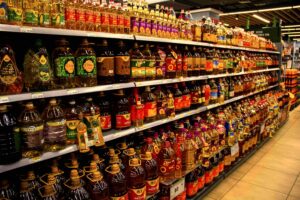Overview
Adani Wilmar, Marico, and Agro Tech Foods Limited (ATFL) are key players in the FMCG sector in India, particularly in the food and beverage industry. They compete in various segments including edible oils, processed foods, and health foods. This comparison delves into their business models, segments, future strategies, strengths, weaknesses, profit formulas, investors, customers, market capitalization, and more.
1. Business Models and Segments
Adani Wilmar: Adani Wilmar operates in the FMCG sector, offering a range of products including edible oils, wheat flour, rice, pulses, groundnut, and more. The company focuses on providing essential kitchen commodities to Indian households under brands like Fortune.
Marico: Marico focuses on consumer goods in the beauty and wellness sectors, with significant operations in India and emerging markets. Key product categories include edible oils (Saffola), hair care (Parachute), and skin care (Nihar). Marico also delves into health foods and male grooming segments.
Agro Tech Foods Limited (ATFL): ATFL is involved in the food processing industry, specializing in edible oils, ready-to-cook popcorn, snacks, and peanut butter. The company markets its products under brands such as Sundrop and ACT II.
2. Future Strategies
Adani Wilmar: Adani Wilmar aims to expand its product portfolio and strengthen its distribution network. The company is focusing on enhancing its value-added products and increasing its presence in rural markets. Additionally, they are investing in sustainable practices and supply chain efficiencies.
Marico: Marico plans to accelerate its growth by diversifying into new product categories, expanding its digital presence, and increasing its footprint in international markets. The company emphasizes innovation in health foods and premium personal care segments.
ATFL: ATFL focuses on expanding its ready-to-cook and ready-to-eat product lines. The company aims to leverage its strong brand equity in the edible oils market to introduce new products and capture a larger market share. They are also focusing on enhancing their distribution channels and increasing brand visibility.
3. Strengths and Weaknesses
Adani Wilmar:
Strengths:
- Strong brand presence with Fortune.
- Wide product portfolio in essential kitchen commodities.
- Robust distribution network across India.
Weaknesses:
- High dependence on the edible oils segment.
- Intense competition from established FMCG brands.
Marico:
Strengths:
- Strong brand portfolio with high consumer loyalty.
- Diversified product range in health and wellness.
- Significant presence in international markets.
Weaknesses:
- Dependency on a few key brands.
- Competitive pressure in the personal care segment.
ATFL:
Strengths:
- Strong presence in the edible oils market.
- Recognized brands in ready-to-cook snacks.
- Focus on innovation and product diversification.
Weaknesses:
- Smaller market share compared to larger FMCG giants.
- Limited international presence.
4. Profit Formulas
Adani Wilmar: Adani Wilmar’s profit formula revolves around high-volume sales of essential commodities with competitive pricing. Their focus on economies of scale and efficient supply chain management aids in maintaining profitability despite thin margins.
Marico: Marico’s profitability is driven by premium pricing of its health and wellness products. The company leverages brand equity and consumer trust to command higher margins. Innovation and brand extensions in personal care also contribute significantly to their profit formula.
ATFL: ATFL’s profit model is based on the sale of high-margin ready-to-cook and ready-to-eat products. The company focuses on product innovation and leveraging its strong brand presence in edible oils to drive sales and profitability.
5. Investors and Market Capitalization
Adani Wilmar: Adani Wilmar is a joint venture between the Adani Group and Wilmar International, with a market capitalization of approximately ₹423 billion as of 2024.
Marico: Marico is a publicly traded company with significant institutional and retail investor participation. Its market capitalization stands at around ₹634 billion.
ATFL: ATFL, also a public company, has a market capitalization of about ₹35 billion. It enjoys a diversified investor base, including significant holdings by institutional investors.
6. Customers and Market Presence
Adani Wilmar: Adani Wilmar serves a broad customer base across India, focusing on urban and rural households. The company’s extensive distribution network ensures deep market penetration.
Marico: Marico caters to a diverse customer base in India and international markets, with a strong focus on urban consumers. Its products are widely available through modern retail channels and e-commerce platforms.
ATFL: ATFL’s primary customers are in urban areas, with a focus on middle and upper-middle-class consumers. The company’s products are available in modern trade outlets and through e-commerce.
Conclusion
Adani Wilmar, Marico, and ATFL are significant players in the FMCG sector, each with unique strengths and strategic approaches. Adani Wilmar excels in essential kitchen commodities, Marico in health and wellness products, and ATFL in innovative food processing. Their future strategies indicate continued growth and competition in the dynamic Indian FMCG market.




